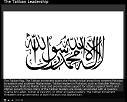|
|
|
Maulana Sufi Mohammad, head of the Tehrik Nifaz-e-Shariah Mohammed, freed from Pakistani prison. |
Within weeks after the new central and provincial governments signaled it would revive negotiations with the Taliban in the Northwest Frontier Province and the lawless tribal areas, Pakistan has freed a senior Taliban leader jailed since 2002. After signing a six-point agreement with the Tehrik Nifaz-e-Shariah Mohammadi, the government released Sufi Mohammed, the leader of the radical Taliban group.
Sufi Mohammed is one of the most dangerous Taliban leaders in the Northwest Frontier Province. As the ideological leader of the outlawed Tehrik Nifaz-e-Shariah Mohammadi (the TNSM, or the Movement for the Implementation of Mohammad’s Sharia Law), he has close links with the Pakistani and Afghan Taliban as well as senior al Qaeda leaders.
The TNSM is known as the “Pakistani Taliban” and is the group behind the ideological inspiration for the Afghan Taliban. The TNSM sent over 10,000 fighters into Afghanistan to fight US forces during the opening stages of Operation Enduring Freedom in late 2001 and 2002. Sufi was jailed by the Pakistani government after the TNSM was banned.
After Sufi’s arrest, Faqir Mohammed assumed control of the TNSM in Sufi’s absence, and the Bajaur tribal agency became al Qaeda’s command and control hub for operations in northeastern Afghanistan. Faqir rolled the TNSM under the banner of Tehrik-e-Taliban Pakistan, or the Movement of the Taliban in Pakistan, which is led by South Waziristan Taliban command Baitullah Mehsud. Faqir is second in commander of the Tehrik-e-Taliban Pakistan.
Sufi is also the father-in-law of Mullah Fazlullah, the radical cleric in charge of the TNSM in the settled districts of Swat and Shangla. Fazlullah seized control of Swat and Shangla in the fall of 2007, prompting the Pakistani military to conduct an operation to eject the TNSM from the districts. Swat was one of the most violent regions in Pakistan in 2007 as Fazlullah’s Taliban carried out a guerrilla and suicide campaign against military and civilian targets.
Time reported Sufi was released from custody in late November 2007 as the government was seeking to arrange a peace deal after the TNSM took control of the districts of Swat and Shangla in the Northwest Frontier Province. While it has not been confirmed, it appears Sufi was transferred from a prison to a hospital to receive medical care and was never returned to prison. The Pakistani general in charge of military operations in Swat and a Taliban spokesman confirmed Sufi’s release in November 2007.
A new peace accord
The full terms of the peace agreement between the TNSM and the Pakistani government have not been released, but the initial reports indicate the TNSM will halt attacks on the Pakistani military. The TNSM “renounced attacks on government forces in the six-point accord but it will be allowed to peacefully campaign for the implementation of Islamic law in Pakistan,” The Washington Times reported based on statements from the spokesman for the Northwest Frontier Province. “He said the pact was signed by Mohammed’s deputy and eight other clerics and four officials, including three provincial government ministers.”
The Pakistani government signed a peace agreement with the TNSM in Bajaur in March 2007, but the agreement failed to curb attacks in Bajaur and the wider Northwest Frontier Province. The TNSM’s takeover in Swat and Shangla was facilitated by the TNSM in Bajaur and in other tribal agencies and provincial districts.
Similar peace accords were signed with the Taliban in North and South Waziristan tribal agencies and in the district of Swat. The Taliban used these peace accords to consolidate power throughout northwestern Pakistan. This allowed al Qaeda to establish training camps throughout the region.
|
Multimedia presentation of the senior Taliban commanders in Pakistan and Afghanistan. Click to view. |
Trading Taliban leader for “peace”
The release of other senior Taliban leaders may be forthcoming. The Taliban have called for the release of Sufi along with Maulana Abdul Aziz, the radical leader of the Red Mosque, and “five Afghan Taliban and the three men arrested on charges of allegedly plotting Benazir Bhutto’s assassination – Aitzaz Shah, Hussnain and Rafaqat,” the Daily Times reported. The Taliban are demanding their release in exchange for Tariq Azizuddin, Pakistan’s ambassador to Afghanistan.
Azizuddin was kidnapped in February 2008 while traveling through the Khyber tribal agency on his way to Kabul. The Taliban demanded the government release Mansoor Dadullah, the former military commander of the Taliban in Afghanistan. Mullah Obaidullah Akhund, the former defense minister for the Taliban, is also in Pakistani custody. Obaidullah was captured by Pakistani security forces in March 2007 and released in November the same year in exchange for Pakistani soldiers captured by Baitullah Mehsud. Pakistan rearrested Obaidullah in February 2008.
See The Fall of Northwestern Pakistan: An Online History for more information on the rise of al Qaeda and the Taliban in Pakistan and the peace agreements signed between the government and the Taliban.










4 Comments
It seems like the new government is just as favorably inclined toward the militants as we feared they might be during the recent election. The heads of the two leading parties in addition to having a history of genuflecting to the militants aren’t well disposed to the US either.
I do not know what spin people will choose to put on this but releasing the high level terrorist commanders at the same time the militants are claiming they will cut the supply routes from Peshawahr to Afghanistan doesn’t sound very promising for the GWOT to me. Let’s hope the army is not inclined to give away the store and can stand up for some sort of security effort in the NWFP and at least make an effort to keep the supply routes open.
Syed Saleem Shahzad sees the hand of al-Qaeda in the negotiations.
Asia Times: Pakistan faces a lose-lose situation
The negotiating terms between the Taliban and the Pakistani government are evolving over time.
Peace Agreement=Pakistan is militarily inept